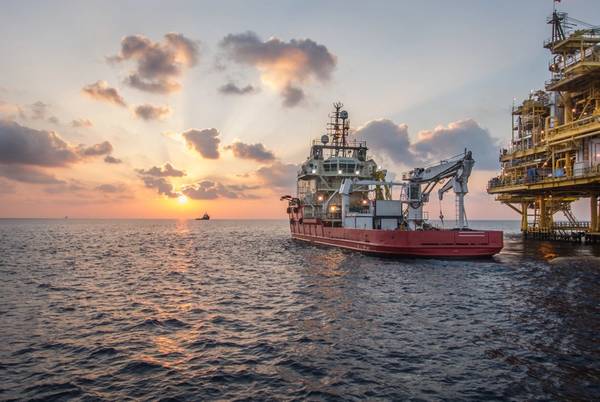
To thrive in the long term, the offshore industry must turn its attention to extracting—and making the most of—another key resource: data. This will help companies stay afloat in an increasingly challenging economic context and enable them to play their part in the energy transition.
These are certainly challenging times for the offshore oil and gas sector. The COVID-19 pandemic has brought unprecedented uncertainty, with dramatic fluctuations in demand and prices, as well as sudden lockdowns and travel restrictions.
The pandemic has also highlighted a key vulnerability: the sector’s low digital maturity. As noted in Deloitte’s 2021 oil and gas industry outlook, the sector is still at the early stages of the digital transition, making limited use of data and instead relying on paper, whiteboards and human actions on-site to ensure the smooth running of its operations. As the world turned to remote working and international travel was halted, companies realized this significantly limited their ability to run their operations from a distance.
Digitalization also has the potential to help the industry navigate some of the profound transformative changes it faces, from ever-shrinking operating margins to a growing pressure to cut carbon emissions.
Turning data into efficiencies
Data has tremendous potential to improve the performance of daily marine logistics operations, unlocking new efficiencies and generating savings that can be vital, given the slim operating margins that many organizations, including both energy companies and their supply chain partners, have to juggle with.
Many offshore companies and service providers already have access to a wealth of valuable information, such as vessel positioning, weather conditions and fuel consumption. Yet they often fail to fully take advantage of the opportunities presented by that data, due to its poor quality, sheer volume or because it is too fragmented and siloed—meaning that it is difficult to understand what the data can tell you.
Only when processed and interpreted properly can data provide meaningful insights that help identify and correct inefficiencies. This is the mantra that we have followed at Opsealog. Our service Marinsights combines data integration and processing, expert analysis and data visualization. Those cutting-edge tools don’t replace human capital, but work in synergy with it—delivering a turnkey system that we call “efficiency as a service”.
Working closely with some of the world’s leading energy majors and national oil companies, we have demonstrated that good data management can significantly boost the performance of the offshore support vessel fleet. Our innovative technology has an immediate financial impact by reducing fuel consumption and allowing for better control of other operational costs.
Knowledge is power
The power of data goes beyond optimizing daily operations—it can also inform long-term strategic planning and support the crucial decisions facing a sector in transition.
Good data management provides decision-makers with a comprehensive, evidence-driven picture of their operations and performance, enabling them to take a step back and see bigger trends, gaps and potential areas for improvement. This informs their strategic decision-making over operational patterns and vessel deployment in order to improve performance and cut fuel consumption in a way that is verified and measurable.
On board with the environmental transition
By optimizing their operations through the smart use of data, offshore oil and gas companies are able to reduce their fuel consumption to a minimum. This translates not only into savings, but also in substantial reductions in greenhouse gas (GHG) emissions.
Across a global fleet of more than 470 vessels, Opsealog’s performance management technology has already helped delivering 90,000 tonnes of CO2 savings to date. Changes in the operational behavior of the fleets resulted in a 10% reduction in emissions, and we are confident that emissions could be cut by another 5-10% through further optimization initiatives.
This comes at a time when the need for an energy transition is recognized as inevitable. The offshore oil and gas sector is under pressure to decarbonize, with regulators, supply chains and the general public all demanding an immediate reduction in emissions.
Some companies are leading the way and have already committed to achieving carbon neutrality. Digitalization will play a key role to support the energy transition that is gaining pace in the offshore and maritime sector—not only by enabling direct reductions in GHG emissions, but also by informing the implementation of longer-term plans, such as the adoption of new power sources.
Digitalization does not have to be an expensive, time-consuming process, and a lot can be achieved by implementing technologies that refine and make sense of data that companies already have. But for that data to be consistent, comprehensive and meaningful, it is essential that everyone is on board and understands the value that it brings, from the rig operators and navigation officers who are on the operational frontline, to executives who use it to support their decision-making.
As a result, this welcome transition toward sustainability goes hand in hand with another important shift: the building of a digital culture in the offshore oil and gas sector.
The author
Arnaud Dianoux is managing director of Opsealog, a French Company specialized in performance management for the energy and maritime industries.